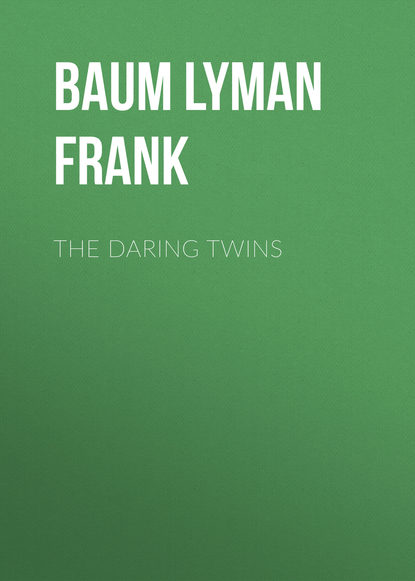По всем вопросам обращайтесь на: info@litportal.ru
(©) 2003-2024.
✖
The Daring Twins
Настройки чтения
Размер шрифта
Высота строк
Поля
PHŒBE’S SECRET
“Let’s get some pails and go to the woods for blackberries,” suggested Sue, posing as peacemaker. “P’raps Auntie’ll make us a pie for dinner.”
“Can’t,” said Don. “I promised old Miss Halliday I’d make her a chicken coop. Another hen is hatching out and there’s no coop to put her in.”
“All right, I’ll help you,” exclaimed Becky, jumping up. “You saw the boards, Don, and I’ll hammer the nails.”
“Can’t you saw?”
“Not straight; but, I’m game to try it.”
A rush was made for the back yard, and Don searched the shed for some old boards to use in making the coop for the expected flock. When the saw and hammer began to be heard Miss Halliday came down from Gran’pa Eliot’s room and stood watching them, her finger on her lips to caution them to be as quiet as possible.
She was old and withered, lean and bent; but her small black eyes still twinkled brightly. Miss Halliday seldom spoke to the Daring children and had as little to do with them as possible. She was virtually the autocrat of the establishment, for old Mr. Eliot was paralyzed and almost speechless. It is true he could mumble a few words at times, but no one seemed able to understand them, except his constant nurse and attendant.
Miss Halliday had been with the Eliots since she was a young woman. She was Gran’ma Eliot’s maid, at first, then the housekeeper, and after Mrs. Eliot’s death and her master’s paralytic stroke, the sole manager of the establishment and a most devoted servant. In person she was exceedingly neat, although she dressed very simply. She was noted in Riverdale for her thrift and shrewd bargaining. They called her miserly until it came to be generally understood that Mr. Eliot’s money was gone; then the merchants respected her careful management of the old man’s finances.
Why Elaine Halliday stuck to her post, under such unpleasant conditions, had puzzled more than one wise head in the village. Some said that Jonathan Eliot had willed her the homestead in return for her services; others, that the frugal stewardess was able to save more than her wages from the reputed wreck of the Eliot fortunes, which had once been considered of enormous extent. Only a very few credited her with an unselfish devotion to her old master.
After the death of his daughter, Mrs. Daring, and just before his own paralytic stroke, Mr. Eliot had had a stormy interview with his son-in-law, Wallace Daring; but, no one except Elaine Halliday knew what it was about. Twenty-four hours later the irascible old man was helpless, and when Phœbe hurried over to assist him he refused to see her or any of his grandchildren. Mr. Daring, a kindly, warm-hearted man, had been so strongly incensed against his father-in-law that he held aloof in this crisis, knowing old Elaine would care for the stricken man’s wants. All this seemed to indicate that the rupture between the two men could never be healed.
After the Daring children had been left orphans and reduced to poverty, Judge Ferguson went to Miss Halliday and pleaded with her to intercede with Jonathan Eliot to give the outcasts a home. The big house was then closed except for a few rooms on the second floor, where the invalid lay awaiting his final summons. There was more than enough room for the Darings, without disturbing the invalid in the least.
At first, the old woman declared such an arrangement impossible; but, Mr. Ferguson would not be denied. He had been Mr. Eliot’s lawyer, and was the guardian of the Darings. If anyone knew the inner history of this peculiar family it was Peter Ferguson. For some reason Miss Halliday had been forced to withdraw her objections; she even gained the morose invalid’s consent to “turn his house into an orphan asylum,” as she bitterly expressed it. The Darings were to be allowed the entire lower floor and the two front bedrooms upstairs; but they were required to pay their own expenses. Elaine declared that it was all she could do to find money enough to feed Gran’pa Eliot his gruel and pay the taxes on the place.
A powerful antipathy, dating back many years, existed between Miss Halliday and the Darings’ black servant, Aunt Hyacinth. During the two months since the Darings had found refuge in the old house not a word had been exchanged between them. But the black mammy, as much the protector of the orphans as Miss Halliday was of their grandsire, strove to avoid trouble and constantly cautioned her flock not to “raise a racket an’ ’sturb poeh gran’pa.” As for the children, they stood so much in awe of the invalid that they obeyed the injunction with great care.
It was not often that Miss Halliday asked the boys to assist her in any way; but, occasionally Phil or Don would offer to do odd jobs about the place when they were not in school.
“It seems like helping to pay the rent,” said Phil, with a laugh, “and as gran’pa quarreled with father I hate to be under obligations to him. So, let’s do all we can to help old Miss Halliday. She has enough to worry her, I’m sure.”
That was why Don set about making the chicken coop this Saturday morning, as he had promised to do, and why Becky and Sue were eager to assist him. The saw was dull, and that made the sawing the hard part of the work until Becky declared she could handle the tool much better than her brother – even if she couldn’t manage to keep on the marked line. He let her try, and then scolded her – and jeered her attempts. A row started very promptly and a struggle began for the possession of the saw, ending by Don’s snatching it away and drawing the jagged teeth across the palm of Becky’s hand. She let go with a scream of pain and the blood spurted forth in a manner to frighten them all.
Don tried to tie his handkerchief over the wound, but with a wail of anguish Becky turned and fled into the house and up the front stairway to the door of Phœbe’s room, leaving a red trail behind her as she went.
“Quick, Phœbe – I’m murdered! Let me in before I die,” she shouted, kicking at the door as she squeezed the wounded hand with the other.
A key turned in the lock and the door flew open.
Phœbe stared a moment at her sister’s white face and noted the stream of blood. Then she drew Becky into the room without a word and led her to the washbasin. She bathed the wound freely with cold water, applied a healing lotion and bandaged the hand, neatly. It was a broad, jagged cut, but not deep. Phœbe knew that it was not a serious wound, but it would be very sore and lame for several days to come.
Becky, trembling with nervousness and weak from fright and the sight of blood, tottered to a lounge and sank down among the cushions.
“How did it happen, dear?” Phœbe now asked.
Becky related the incident with dramatic details until her eyes fell upon a table drawn before the window and covered with papers, among which rested an imposing looking machine.
“Jumpin’ jooks, Phœbe!” she exclaimed; “it’s a typewriter. Where on earth did it come from?”
Phœbe flushed and for a moment looked distressed.
“I rented it,” she replied. “It’s a great secret, Becky, and you must promise not to tell anyone.”
“Can you run it? Have you had lessons?” asked the younger girl, sitting up in her eagerness and forgetting her affliction for a time.
“I’ve taught myself,” said Phœbe. “It is not very hard to learn. At first, you know, I made lots of mistakes; but, now I do very well. I’ve had it almost six months, and every Saturday I typewrite all day.”
“But why? What are you copying?” demanded Becky, going to the table and looking down at the piles of manuscript.
“It is a book of sermons that Doctor Huntley is preparing for a publisher. He is too busy to do it himself, so he gave me the job. I get ten cents a page, and I’ve copied nearly four hundred pages already.”
“My!” cried Becky; “what a lot of money! Whatever will you do with it, dear?”
Phœbe smiled a little sadly, but put her arm around her sister and kissed her, affectionately.
“That’s a part of my secret, dear, and you mustn’t ask me. You’ll not mention the typewriter, Becky – nor anything I’ve told you? I don’t want Phil or the children to know.”
“Trust me!” returned Becky, delighted to share so important a secret with her elder. Then, she remembered her sore hand and lay down upon the couch again, while Phœbe, having once more locked the door, resumed her work.
It was dinner time when Don finished the chicken coop and helped Miss Halliday to move the hen and her newly hatched brood into it. There had been sundry quarrels between him and Sue, who accused him of “spilling Becky’s heart’s blood,” but now the girl was so fascinated by the fuzzy chicks that she was loth to leave them, when Auntie called her to the midday meal.
Phil came in, flushed with his exertions on the ball field, but unusually glum and serious. He found no time for his proposed talk with Phœbe then, for as soon as dinner was over he was obliged to put on his baseball uniform and hurry to the ground, where the important match game with the Exeter nine was to take place.
“Any of you coming to the game?” he inquired.
“We’re all coming,” declared Becky, who now posed as a heroine because of her hurt. But, Phœbe shook her head and smiled.
“I shall be too busy at home, Phil,” she said; “but the others may go.”
He gave her a quick, curious look, but said nothing more.
CHAPTER V
A MATCH GAME
For a long time there had been great rivalry between the ball teams of Riverdale and Exeter; the latter, a small town lying five miles inland, where there was a boys’ preparatory school. This year each had won five games out of a series of ten, and the extra game to be played to-day was to decide the championship. The Riverdale high school captain, Al Hayden, the druggist’s son, had picked his team with great care for this important occasion, and Phil had been chosen pitcher.
The ball grounds were just outside of the village, and not only were the people of Riverdale there in large numbers, but the crowd was augmented by farmers from the surrounding country who had come in for their Saturday trading and took advantage of the opportunity to see a good ball game. Several wagon loads of “fans” from Exeter also rode over in the wake of the bus that carried their ball players, to participate in the fun and excitement.
All classes of people occupied the “bleachers.” Merchants, lawyers and even two liberal minded ministers of the gospel were among them, while Judge Ferguson strolled over as the game commenced, accompanied by his pretty daughter, Janet, to see how Phil conducted himself. The Randolph children were plebeian enough to attend; the manager of the mill was there, and all the small Darings, except Phœbe, eagerly awaited the contest.
There was a stand where red lemonade was sold, and boys carried around baskets of peanuts and popcorn to refresh the audience. Nearly every high school in town had thought it her duty to be present, and their bright ribbons and dresses added a picturesque element to the scene.
Phil Daring appeared as composed as ever, when he entered the arena with his comrades; but, never for a moment, since his interview with Mr. Ferguson had his mind been free from grief, humiliation and bitter disappointment. He nodded and smiled as the throng greeted him with hearty cheers; yet all the time he was thinking to himself: “My days of fun and freedom are nearly over now. I must give up college, for good and all, and settle down somewhere to make a living and help support the children. I don’t know what I can do, I’m sure, that will earn the needed money. No one in Riverdale needs any help such as I can give, and I’m not experienced enough to be of much service in a big city. It will be a hard fight, with all the chances against me; but I’ve got to undertake it and make a go of it.”
These and similar thoughts flooded his mind to the exclusion of all else. Mechanically, he tossed the ball in practice, and when time was called he took his position in the pitcher’s box with scarcely a realization of what he was doing.
A sudden silence fell upon the throng as Phil pressed the new ball into his palm, drew back with his well-known easy swing and sent the sphere flying through the air. There followed a low murmur that sounded like a groan as the ball flew wide and smashed against the back-stop. Some of the Exeter people laughed. But Phil was unaware of either moans or laughter. He was thinking of something else more important. Getting the ball again, he made another toss and the batter caught it with a full blow and sent it flying into the field for a two-bagger. Al Hayden looked grave at this but said nothing. Phil was Riverdale’s crack pitcher, as a rule; but, perhaps he hadn’t his hand in yet.

















